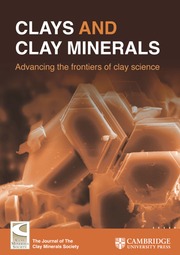Crossref Citations
This article has been cited by the following publications. This list is generated based on data provided by
Crossref.
Nakao, A.
Funakawa, S.
Watanabe, T.
and
Kosaki, T.
2009.
Pedogenic alterations of illitic minerals represented by Radiocaesium Interception Potential in soils with different soil moisture regimes in humid Asia.
European Journal of Soil Science,
Vol. 60,
Issue. 1,
p.
139.
Jacquat, Olivier
Voegelin, Andreas
and
Kretzschmar, Ruben
2009.
Local coordination of Zn in hydroxy-interlayered minerals and implications for Zn retention in soils.
Geochimica et Cosmochimica Acta,
Vol. 73,
Issue. 2,
p.
348.
Nakao, A.
Funakawa, S.
and
Kosaki, T.
2009.
Hydroxy‐Al polymers block the frayed edge sites of illitic minerals in acid soils: studies in southwestern Japan at various weathering stages.
European Journal of Soil Science,
Vol. 60,
Issue. 1,
p.
127.
Velde, Bruce
and
Barré, Pierre
2009.
Soils, Plants and Clay Minerals.
p.
1.
Mareschal, Louis
Ranger, Jacques
and
Turpault, Marie Pierre
2009.
Stoichiometry of a dissolution reaction of a trioctahedral vermiculite at pH 2.7.
Geochimica et Cosmochimica Acta,
Vol. 73,
Issue. 2,
p.
307.
Naderizadeh, Z.
Khademi, H.
and
Arocena, J.M.
2010.
Organic matter induced mineralogical changes in clay-sized phlogopite and muscovite in alfalfa rhizosphere.
Geoderma,
Vol. 159,
Issue. 3-4,
p.
296.
Aparicio, Patricia
Ferrell, Ray E.
and
Galán, Emilio
2010.
Mg and K exchange cation effects on the XRD analysis of soil clays.
Philosophical Magazine,
Vol. 90,
Issue. 17-18,
p.
2373.
Barré, Pierre
and
Velde, Bruce
2010.
Clays Developed Under Sequoia gigantia and Prairie Soils: 150 Years of Soil-Plant Interaction in the Parks of French Châteaux.
Clays and Clay Minerals,
Vol. 58,
Issue. 6,
p.
803.
Meunier, Alain
Petit, Sabine
Cockell, Charles S.
El Albani, Abderrazzak
and
Beaufort, Daniel
2010.
The Fe-Rich Clay Microsystems in Basalt-Komatiite Lavas: Importance of Fe-Smectites for Pre-Biotic Molecule Catalysis During the Hadean Eon.
Origins of Life and Evolution of Biospheres,
Vol. 40,
Issue. 3,
p.
253.
Khayamim, Fatemeh
Khademi, Hossein
and
Sabzalian, Mohammad R.
2011.
Effect of Neotyphodium endophyte-tall fescue symbiosis on mineralogical changes in clay-sized phlogopite and muscovite.
Plant and Soil,
Vol. 341,
Issue. 1-2,
p.
473.
Uzarowicz, Łukasz
Skiba, Stefan
Skiba, Michał
and
Šegvić, Branimir
2011.
Clay-Mineral Formation in Soils Developed in the Weathering Zone of Pyrite-Bearing Schists: A Case Study from The Abandoned Pyrite Mine in Wieściszowice, Lower Silesia, SW Poland.
Clays and Clay Minerals,
Vol. 59,
Issue. 6,
p.
581.
Arostegi, J.
Baceta, J. I.
Pujalte, V.
and
Carracedo, M.
2011.
Late Cretaceous—Palaeocene mid-latitude climates: inferences from clay mineralogy of continental-coastal sequences (Tremp-Graus area, southern Pyrenees, N Spain).
Clay Minerals,
Vol. 46,
Issue. 1,
p.
105.
Uzarowicz, Ł.
Šegvic, B.
Michalik, M.
and
Bylina, P.
2012.
The effect of hydrochemical conditions and pH of the environment on phyllosilicate transformations in the weathering zone of pyrite-bearing schists in Wieściszowice (SW Poland).
Clay Minerals,
Vol. 47,
Issue. 4,
p.
401.
Díaz-Castellón, Rodolfo
Hubbard, Bernard E.
Carrasco-Núñez, Gerardo
and
Rodríguez-Vargas, José Luis
2012.
The origins of Late Quaternary debris avalanche and debris flow deposits from Cofre de Perote volcano, México.
Geosphere,
Vol. 8,
Issue. 4,
p.
950.
Yin, Ke
Hong, Hanlie
Churchman, Gordon Jock
Li, Rongbiao
Li, Zhaohui
Wang, Chaowen
and
Han, Wen
2013.
Hydroxy-interlayered vermiculite genesis in Jiujiang late-Pleistocene red earth sediments and significance to climate.
Applied Clay Science,
Vol. 74,
Issue. ,
p.
20.
Mareschal, Louis
Turpault, Marie-Pierre
Bonnaud, Pascal
and
Ranger, Jacques
2013.
Relationship between the weathering of clay minerals and the nitrification rate: a rapid tree species effect.
Biogeochemistry,
Vol. 112,
Issue. 1-3,
p.
293.
Bishop, Janice L.
Loizeau, Damien
McKeown, Nancy K.
Saper, Lee
Dyar, M. Darby
Des Marais, David J.
Parente, Mario
and
Murchie, Scott L.
2013.
What the ancient phyllosilicates at Mawrth Vallis can tell us about possible habitability on early Mars.
Planetary and Space Science,
Vol. 86,
Issue. ,
p.
130.
Fernández-Caliani, J. C.
Timón, V.
Rivera, M. B.
Giráldez, I.
and
Pérez-Ló pez, R.
2013.
Experimental and theoretical evidence of zinc structurally bound in vermiculite from naturally metal-enriched soils.
Clay Minerals,
Vol. 48,
Issue. 3,
p.
529.
Schumann, Dirk
Hartman, Hyman
Eberl, Dennis D.
Sears, S. Kelly
Hesse, Reinhard
and
Vali, Hojatollah
2013.
The Influence of Oxalate-Promoted Growth of Saponite and Talc Crystals on Rectorite: Testing the Intercalation-Synthesis Hypothesis of 2:1 Layer Silicates.
Clays and Clay Minerals,
Vol. 61,
Issue. 4,
p.
342.
Galán, E.
and
Ferrell, R.E.
2013.
Handbook of Clay Science.
Vol. 5,
Issue. ,
p.
83.

